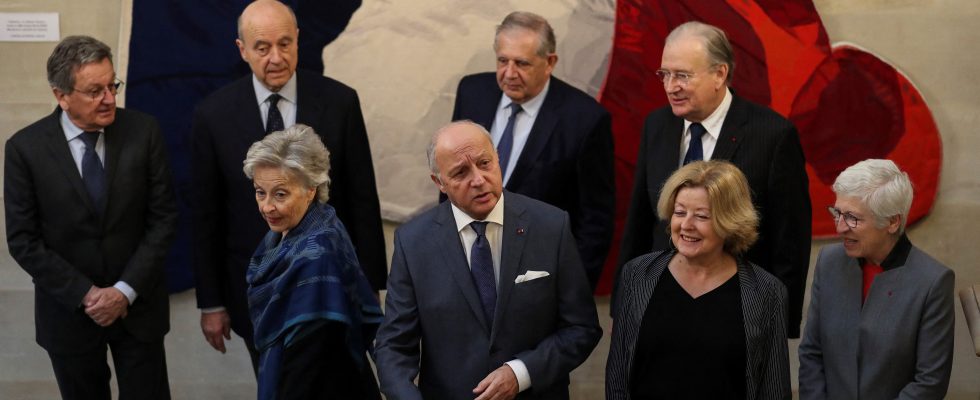Law enforcement massed outside its doors. A demonstration prohibited near the Palais-Royal. A Sage, “stretched like a crossbow”, recently crossed by a deputy. Never has a decision of the Constitutional Council been so awaited by public opinion. The court will rule this Friday, April 14 on the pension reform, at the origin of an unprecedented political crisis since the re-election of Emmanuel Macron.
From this legal decision, the executive expects a political benefit. It would seal the end of a “democratic journey” and open a new page of the five-year term. In the majority, it is hoped that a validation of the text will discourage “reasonable opponents” from pursuing social mobilization. The left wishes, it, harvest on the legal ground the victory which it did not obtain in the street and with the Parliament.
Politically-tinged legal grievances
Law, nothing but law. On paper, however, the case is simple. The Constitutional Council, seized by the Nupes, the RN and also the government, must control the conformity of the pension reform with our fundamental law. Whatever its merits, politics has no place within the Institution. “The Council judges the law”, summarizes its former president Jean-Louis Debré. “It is not a decision of political expediency, insists the boss of the Renaissance group Aurore Bergé. It is a decision on the constitutional conformity of the legislative vehicle that we have chosen and what does or does not fit into this vehicle.”
The authors of the referral dispute the use of an amending social security financing bill to postpone the legal retirement age to 64 years. The sole reason for this choice would have been to frame the debates within the time limits provided for in Article 47.1 of the Constitution. The cumulative use of a series of provisions, such as Article 49.3 or Article 44.3 on blocked voting, is pinpointed. To this “misuse of power” is added another criticism: the debates would be struck with “insincerity” because of the mistakes of the government on the minimum pension of 1200 euros or long careers. These legal grievances have a political tinge as they make the Constitutional Council a legislative counter-power. “This would call into question the presidential character of our regime and would force the executive to respect Parliament more,” notes left-wing MEP Emmanuel Maurel.
Law and politics are intertwined by nature, the first serving to satisfy the objectives of the second. The law is subject to interpretations, never far from the ideological presuppositions of those who profess them. Evidenced by the divergent opinions of professors of constitutional law on the validity of the pension reform. Proponents of a parliamentary regime have a more severe reading of government strategy than supporters of a strong executive. “Whatever we say, the Council also judges the political opportunity”, judge in private the deputy LR of Lot Aurélien Pradié, opposed to the reform and author of individual observations before the court.
“We pulled all the threads until they were tight”
This confusion is fueled by the composition of the instance. Its nine members are appointed by the Head of State and the presidents of the two assemblies. Which often dig into the political staff. Alain Juppé is a sage, as are two former ministers of Emmanuel Macron, Jacques Mézard and Jacqueline Gourault. It would be unfair to make the Council an institution that obeys orders. From the partial censorship of security retention to that of the 75% tax for the highest incomes, the jurisdiction has proven its independence from power. The deliberation is finally collective, and the mandate of the members is non-renewable.
But perception and reality are one in politics. Its composition arouses suspicion. “He is very political”, noted on Public Senate the deputy LFI Alexis Corbière, fearing that the Council would “let go of nothing, neither censorship, nor referendum of shared initiative”. A formula that sounds like a claim to political authority. Jean-Louis Debré is aware of this ambiguity. Had he not been accused of wanting to “pay” Nicolas Sarkozy, after the rejection of his campaign accounts in 2012? “The reading of the decision this Friday will be legal, the interpretation will be political, anticipates the Chiraquien. This is the nature of things.”
In this suspended time, everyone makes predictions. The majority is calm, but expects that several parts of the reform – senior index, senior CDI – will be censured as social riders. “We pulled all the threads to the point of tenderness, notes a Renaissance deputy. But total censorship in the name of the abuse of rights would be a tsunami. in politics.” The left harbors few hopes and promises to continue the mobilization after the verdict. “Who believes in such an earthquake? We must not sell illusions to the French”, analyzes the coordinator of LFI Manuel Bompard.
“The Council will leave feathers there”
The general opinion is that the Constitutional Council has nothing but blows to take. To validate the heart of the law is to expose oneself to trial in submission to the executive. In the event of censorship, some will shout at the government of the judges. The delicate relationship between Emmanuel Macron and the President of the Institution Laurent Fabius will not fail to be exhumed – it already is – by majority executives.
By making the Council the terminus of the “democratic journey”, the executive has put unprecedented pressure on the institution and is imposing an exorbitant role on it. “The Council will leave feathers there. Whatever its decision, there will be a suspicion of political connivance”, deplores Aurélien Pradié. All under the gaze of the French, who will have their eyes riveted on Friday on the Royal Palace. A leftist parliamentarian summarized: “Fabius will be faced with a dilemma: it is not up to him to settle a political dispute but he knows that if the Council closes the doors, the protest in the street and against the institution will be maximal. Are we still really within the law?”
